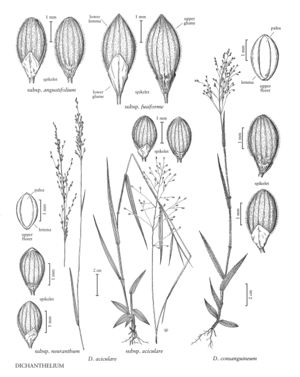familyPoaceae
subfamilyPoaceae subfam. Panicoideae
genusDichanthelium
speciesDichanthelium aciculare
subspeciesDichanthelium aciculare subsp. fusiforme
Dichanthelium aciculare subsp. fusiforme
Synonyms: Panicum fusiforme
Treatment appears in FNA Volume 25. Treatment on page 444.
Revision as of 03:04, 30 July 2020 by imported>Volume Importer
Resembles subsp. angustifolium vegetatively except that the culms often taller and more slender. Panicle branches ascending, not appearing 1-sided. Spikelets 2.9-3.6 mm, fusiform, bases strongly attenuate, apices pointed or beaked, lower glumes attached 0.3-0.5 mm below the upper glumes.
Discussion
Dichanthelium aciculare subsp. fusiforme grows in sandy pine or oak savannahs. It tends to replace D. aciculare subsp. angustifolium from southern Florida through Central America and the Antilles.
Selected References
None.
Lower Taxa
None.
"usually distinctly longer and narrower" is not a number."decumbent" is not a number.
... more about "Dichanthelium aciculare subsp. fusiforme"
absent +
common +
absent +
bulliform +
absent +
membranous +
absent +
absent +
arising +
single +
winter +
differentiated +
cormlike +
attenuate +
narrow +
hard +
thick +
transitional +
cluster +
distinct +
adaxial +
involute +
narrow +
rebranching +
absent +
sterile +
spikelike +
absent +
sterile +
not developed +
absent +
longer +
sometimes longer +
branched +
annual +
climbing +
floating +
herbaceous +
flabellate +
woody +
narrow +
1/2 +
waisted +
large +
hard +
capillary +
germination +
adjacent +
sometimes longer +
well-developed +
absent +
reduced +
bisexual +
absent +
gaping +
shorter +
shorter or longer +
upper +
unequal +
membranous +
equal +
papillose-based +
ascending +
absent +
lacking +
uncinate +
punctate +
Present +
axillary +
elongated +
absent +
distichous +
hyaline +
coriaceous +
true +
absent +
membranous +
free +
absent +
inconspicuous +
glabrous +
cuneate +
fleshy +
adjacent +
transitional +
wrinkled +
staminate +
sterile +
reduced +
veined +
attached +
thin +
absent +
thin +
separated +
hyaline +
involute +
absent +
16-25 +
prominent +
absent +
glabrous +
keeled +
ascending +
subterranean +
absent +
separating +
thin +
contracted +
developing +
well-exserted +
chasmogamous +
evident +
reduced +
cleistogamous +
reduced +
higher +
included +
small +
open +
closed +
shorter +
complex +
bisexual +
unisexual +
sessile +
length +
attached +
absent +
fusiform +
narrow +
varying +
simple +
convex +
Dichanthelium aciculare subsp. fusiforme +
Dichanthelium aciculare +
subspecies +
hyaline +
membranous +
sessile +
apiculate +
bisexual +
plump +
5-11-veined +
not saccate +
slightly shorter +
absent +
subequal +
glabrous +
shiny +
chartaceous-indurate +
absent +
taller +
slender +
rhizomatous +
grayish-green +
perennial +
herbaceous +
various +
